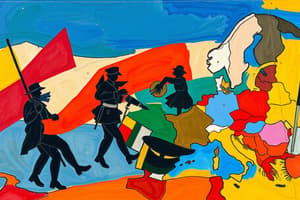Podcast
Questions and Answers
What were the four main causes of World War I?
What were the four main causes of World War I?
- Imperialism (correct)
- Alliances (correct)
- Militarism (correct)
- Nationalism (correct)
What were the years of World War I?
What were the years of World War I?
1914-1918
Name the two main alliances before World War I.
Name the two main alliances before World War I.
- Allied Powers
- Central Powers
- Triple Entente (correct)
- Triple Alliance (correct)
Who was Archduke Ferdinand and why was he important?
Who was Archduke Ferdinand and why was he important?
Why did Britain officially declare war on Germany?
Why did Britain officially declare war on Germany?
Who was the President of the United States during World War I?
Who was the President of the United States during World War I?
What was Woodrow Wilson's plan for peace called?
What was Woodrow Wilson's plan for peace called?
Who was the leader of Germany during World War I?
Who was the leader of Germany during World War I?
During what years did Kaiser Wilhelm II rule?
During what years did Kaiser Wilhelm II rule?
What was the Western Front?
What was the Western Front?
Flashcards are hidden until you start studying
Study Notes
Causes of World War I
- Four main causes: Militarism, Alliances, Imperialism, Nationalism.
- Assassination of Archduke Franz Ferdinand of Austria-Hungary triggered the war.
Timeline of World War I
- War years: 1914 to 1918.
Major Alliances Before WWI
- Triple Entente: Britain, France, Russia.
- Triple Alliance: Germany, Austria-Hungary, Italy.
Archduke Franz Ferdinand
- Heir to the Austro-Hungarian throne; his assassination catalyzed the war.
- His death by Gavrilo Princip led Austria-Hungary to declare war on Serbia.
- The conflict expanded as alliances drew other nations in, resulting in a large-scale war.
Britain's Declaration of War
- Britain aimed to prevent any single power from dominating Europe.
- Perceived Germany as the greatest threat due to its strong economy and military.
- Britain supported Russia and France and was part of the Triple Entente but hesitated to enter war initially.
- Germany's invasion of Belgium prompted Britain to act, citing obligations under the Treaty of London (1839).
- Britain declared war on Germany in August 1914, leading to a full-scale conflict involving multiple nations.
United States During the War
- President: Woodrow Wilson.
- Proposed peace plan: 14 Points.
Wilson's 14 Points
- Advocated for open diplomacy, arms reduction, freedom of the seas, free trade, a League of Nations, and national self-determination.
- France and Britain largely disagreed, seeking to maintain colonial empires.
- Only the League of Nations was included in the Treaty of Versailles.
German Leadership
- Leader during the war: Kaiser Wilhelm II (reigned 1888-1918).
- Advocated for aggressive foreign policies, aiming to expand colonies and navy.
- His policies contributed to pre-war tensions and military buildup in Germany.
Western Front
- Characterized by trenches and fortifications extending from Switzerland to the North Sea.
- Main battlefront between Germany and the Allies (France and Britain).
- The situation resulted in a costly deadlock, leading to high casualties on both sides.
Studying That Suits You
Use AI to generate personalized quizzes and flashcards to suit your learning preferences.




